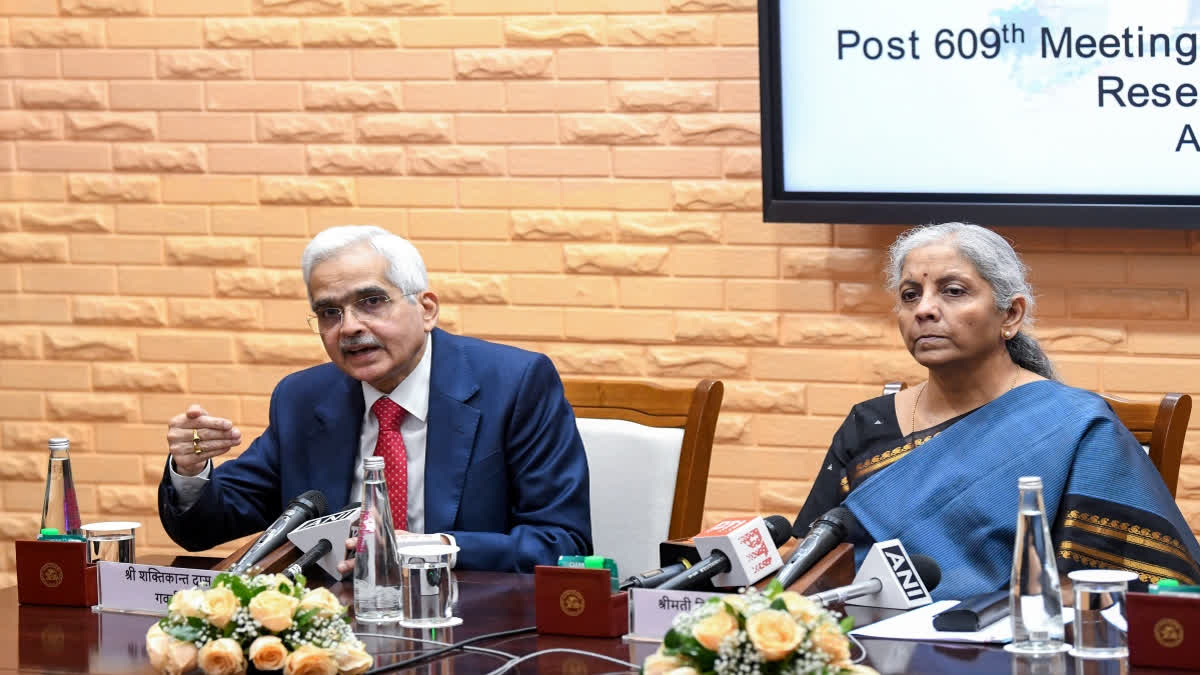Hyderabad: In its monetary policy committee meeting held early this month, the Reserve Bank of India, decided to keep the benchmark interest rate – the repo rate unchanged, despite dissent notes by two of six members of the committee. As per the minutes of the meeting released Thursday, the reason appears to be sticky high food inflation that is not leading to interest rate cuts by the Reserve Bank despite demand from some quarters that a rate cut is needed to support the economic growth.
Under the Reserve Bank of India Act of 1934, the Reserve Bank is tasked with maintaining the retail inflation in the country as per a target band set by the government under the law while supporting the economic growth. However, it is a difficult task as the measures taken by the RBI to tackle the inflation such as restricting money supply adversely impact the economic growth and striking a delicate balance between the two is a difficult task for any central bank.
As per Section 45ZL of the RBI Act, the Bank is required to publish minutes of its money policy committee meeting, which includes the resolution adopted, the vote of each member and the statement of each member of the committee in the said meeting.
The minutes showed that out of the six members, Ashima Goyal and Jayanth R Varma voted against maintaining the status quo while four other members including the RBI Governor Shaktikanta Das and Dy Governor Michael Debabrata Patra, who is also in charge of monetary policy of the bank, voted in favour of maintaining the status quo.
In his statement, RBI Governor Das, who also chairs the monetary policy committee meetings, observed that though the inflation is gradually trending down, the pace is slow and uneven.
Das said durable alignment of inflation to the target of 4.0 per cent is still some distance away. Persistent food inflation is imparting stickiness to headline inflation and inflation expectations need to be kept anchored.
He also expressed his fear of persistently high food inflation spilling over to the core inflation (inflation excluding food and fuel), saying it has to be avoided.
"At such a crucial juncture, steady growth impulses are allowing monetary policy to unambiguously focus on supporting a sustained descent of inflation to the target," said RBI Governor Shaktikanta Das.
While three other members, RBI Dy Governor MD Patra, Shashank Bhide, and Rajiv Ranjan supported the view taken by the Shaktikanta Das also voted in favour of maintaining the status quo, two other members Ashima Goyal and Jayanth R Varma disagreed.
Dr Ashima Goyal, observed that though the food inflation has risen in the country but the heat wave has had less than the expected effect. In her note she observed that a rise in the vegetable prices was transient in nature and it was already correcting with the good monsoon and the supply chains seem to be improving.
"Since Indian inflation is not well measured, and could be over or under-estimated, too much precision with regard to a target is unproductive,” she said in her note while disagreeing with the majority view to maintain the status quo.
On the other hand, Jayanth R Varma, while disagreeing with the majority view of maintaining the status quo, clearly illustrated the risk of persistently high food inflation.
In his statement, Dr Varma observed that in the recent period, food inflation has remained persistently elevated, averaging 8 per cent since July 2023 and has contributed to around 75 per cent of the headline inflation during April-June 2024.
"Such persistent food inflation pressures cannot be ignored considering the high share of food in household consumption basket and risk of its spillovers to non-food core CPI components,” said Dr Varma, adding that in such a scenario, monetary policy should continue to remain actively disinflationary to ensure that inflation and inflation expectations remains durably aligned to the target rate.
He also highlighted the persistent divergence between food inflation and core inflation as food prices remained elevated while prices of other products and services (excluding food and fuel) remained subdued.
He said as long as food constitutes an important segment of the consumer basket and food inflation shows signs of persistence, one cannot ignore food in the CPI basket given the common perception of households to look at food prices while evaluating inflation.
We cannot let down our guards against inflation at this juncture, when supply shocks are proving to be so persistent, noted the economist.
The risk of supply shocks due to extreme weather
What is worrying the Reserve Bank in its battle against high food inflation is the risk of supply side shocks despite a favourable monsoon which has resulted in higher Kharif sowing - India's summer crop sowing season.
The major risks to supply side shocks are adverse climatic conditions such as unseasonal and unexpected rains, hailstorms that destroy standing food and vegetable crops and may lead to sudden spikes in vegetable, food and fruit prices.
For example, high rainfall in some parts of the country last month resulted in heavy losses to the standing vegetables crops and extreme heat wave conditions witnessed in May-June this year have also resulted in loss of crops. These two back-to-back adverse weather events result in soaring prices of staple vegetables such as tomatoes and potatoes.
As a result, tomato prices in the national capital region sky-rocketed from Rs 10-20 per kilogram to Rs 80-100 per kilogram last month. Same phenomenon was also observed in July last year as well.
Such extreme weather events result in supply side shocks for food prices that cannot be effectively tackled by monetary policy actions by the Reserve Bank of India that is why the Economic Survey for FY 2023-24, which was released last month, suggested removing food items from the inflation targeting framework.



